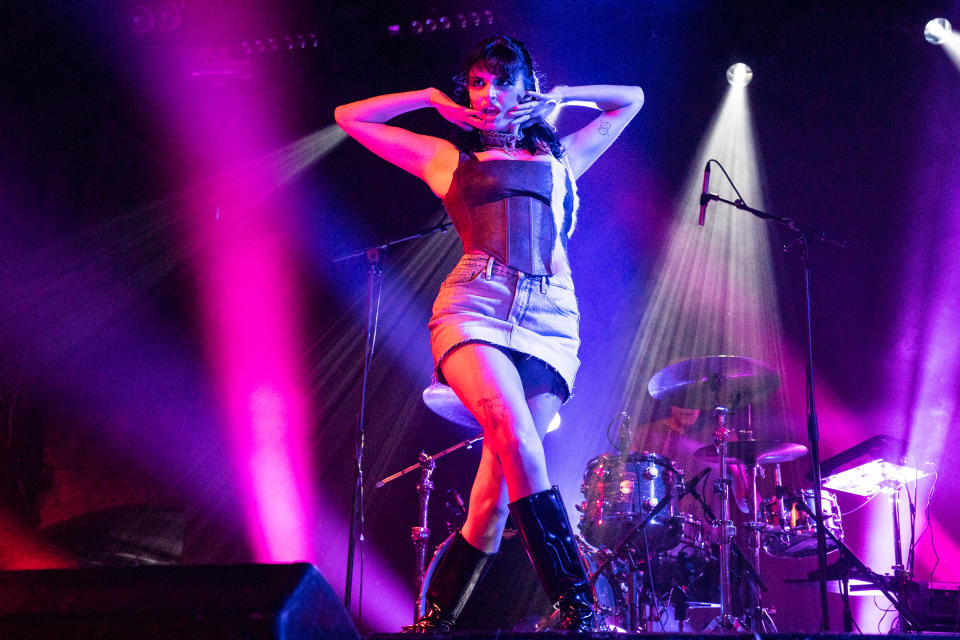Queer, wise and ‘making up for lost time’: How Rebecca Black grew up after ‘Friday’
Rebecca Black is a philosopher. And it makes sense for somebody tethered to the internet in such an enduring way — there’s no choice but to peer inward.
“It’s important to be able to develop a trust within yourself that, even if it is just a moment, it can be true for a moment,” she tells TODAY.com. “That was something that I really lacked for a long time. And all that did was make me look outward.”
Twelve years have passed since Black, now 26, became a sensation when her song “Friday” went viral and subsequently captivated a generation of fellow internet dwellers like herself. At first, “Friday” — and its lyrics “It’s Friday, Friday / Gotta get down on Friday” — seemed easy to poke fun at. Now, it’s a pop earworm that never needs reintroduction, and lambasting it has become rightfully passé.
But in the timeline of Black’s career, it’s Sunday, if you will — the proverbial beginning of it all.

These days, she DJs at Coachella, headlines Pride festivals and has joined the lineup this summer at BST Hyde Park with Blackpink, one of the biggest acts in K-pop. In February, Black dropped a debut studio album, “Let Her Burn,” and went on tour soon after, making stops in Montreal, New York City, Los Angeles and other major cities.
While her bops are indeed bopping, her authentic and forthright relationship with the LGBTQ+ community is equally resonant. Black, who came out as queer in 2020, has a playful term to describe her experience of sharing her queer identity: “practicing gayness.”
She also recognizes the responsibility of her platform. She’s been vocal about trans rights, gun control legislation in the wake of the Colorado Springs shooting and championing the LGBTQ+ community.
“The climate around queerness and especially what’s happening within our government here in the States right now … we do (need to) stand up for queer people, whether it be those around us or the ones in our lives,” she says.
After attending Pride at age 21, Black says she “came to terms” with her identity that summer and then “spent every night in gay bars and gay clubs … not even drinking.” One of her first experiences in an LGBTQ+ space — a “core memory,” she says — was making out with a girl for the first time at LA Pride, when either Kim Petras or Kehlani were performing. (Either options are queer canon, let’s be real.)
“I was making up for a lot of lost time that I had as a teenager,” she says, “because my sexuality was something that I kind of came into later on in life.”
Black grew up on sites like Pinterest and Tumblr. (She still uses Pinterest, she admits.) During those early social media days, she found her “first subcultures of the internet” that really spoke to her. She also says that as a queer person, spending time on these platforms could be “trivialized” by older folks, or deemed “as meaningless and superficial,” but disagrees with that sentiment.
As someone who was homeschooled, Black found other artists, communities and even some of her “closest friends” online, and that really struck a chord with her as a teenager.
“I wish I could go back and just witness myself,” Black says. “Understanding that kind of fantasy that we build of who we want to be in our own heads.”
Black has an enviable capacity for introspection. As she unpacks the differences between writing and performing — which may seem obvious to some — Black reveals the stage can feel just as solitary.
“There are so many moments on stage where you feel like you’re (facing a) double-sided mirror type of thing. And it can feel really lonely. I mean, I think one thing that people don’t really talk about is sometimes how quiet it can be onstage and how vulnerable that can make you feel.”
She seems to push through those feelings, though, and says she has relearned her relationship with the audience: “I can just be myself, you know, and talk to an audience the way that I would talk to anybody.”
In July, she’ll perform alongside Blackpink at BST Hyde Park, London’s popular concert series. So how does she deal with pressure to prepare for a stage like that?
“A big part of performing, especially as you’re trying to build your own confidence — and this has helped me — is it’s OK to live in your own delusion a little bit.”
She adds, “There will never be a perfect show. And at the same time, every night is a perfect show.”
It’s a freeing thought. And this tenet shouldn’t only be applicable to pop artists. In fact, as open she is to wisdom, both receiving it and sharing her own, she does subscribe to a person having “intuition and trust within yourself first.”
“Whatever happens afterwards, you’ll pick up the pieces,” she says, “but at least you have information on yourself.”
This article was originally published on TODAY.com